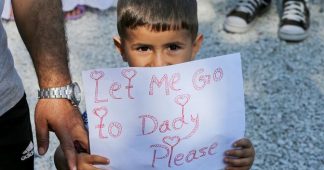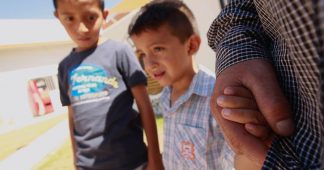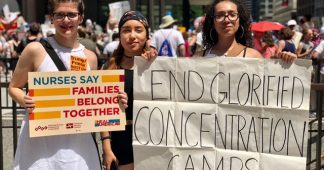Suffer the Little Children
Michael Bader
July 5th, 2018
Image source https://www.etsy.com/ie/listing/609006094/original-painting-usa-gop-republican?ref=shop_home_active_11
Sometimes it seems that it took images of crying toddlers and grieving mothers to mobilize Americans against Donald Trump and his Right-wing enablers. Of course, there has certainly been a “resistance” to Trump before now, but nothing like what erupted following the implementation of Trump’s zero tolerance policy. Notwithstanding, the current Right-wing echo chamber’s cynical spin about these news stories, the outpouring of spontaneous indignation about forced family separations at the border spanned the political spectrum. Christian evangelicals, the UN Commission on Human Rights, several Republican lawmakers, and even the Pope were all upset and angry. The depiction of children who lost their mothers sparked greater and more intense resistance than most of Trump’s other offensive and provocative initiatives.
It’s worth noting that we didn’t see that same degree of passion about children who were about to lose their health insurance last year.
We certainly don’t read much about the heartbreaking lot of latchkey children raised in families headed by single mothers working for stagnant wages, barely making ends meet, or children raised by parents addicted to opiates. These kids will never appear on the cover of Time Magazine. The media doesn’t cover what Richard Sennett and Jonathan Cobb once called the “hidden injuries of class.” Instead, the media dotes on the latest news about Robert Mueller and Michael Cohen. And as they do so, the Left and Right inevitably settle into their own tribal tents.
Why doesn’t the plight of the 16 million children currently being raised in poverty elicit the outrage that these children at the border do? Why exactly did so many people seem to wake up to the cruelty of Trump and the Republican Party when immigrant families were broken up?
On one level, it certainly seems that the abstract facts of poverty, social injustice, and the unequal distribution of wealth don’t elicit the deep psychological reflexes that are triggered by the stories and pictures of real panicked and grief stricken individual children. The former is suffering at a distance; the latter is up close and highly personal.
These reflexes and triggers are not uniquely American, nor do they have anything at all to do with American values. Instead, I think that our moral outrage reflects the universal importance of attachment in human life – the central importance of the earliest connections between parents – especially mothers – and children. Child development experts have warned us for a long time that any disruption to such ties in the course of development results in tremendous grief and distress, and if the rupture is great enough, it causes significant trauma that indelibly damages children’s brain development and psyches. Research has shown that significant disruptions of attachment result in later life in an increase of cardiovascular disease, anxiety disorders, addiction, criminality, depression, obesity, and suicide.
I believe that we react so strongly to stories of broken attachments because all of us have experienced, even in the best of circumstances, some version, some degree, of exactly such a loss. When we see it on television, it resonates with unconscious reservoirs of grief and trauma in all of us.
Even in the best of circumstances, growing up invariably involves some degree of loss. Losses attendant on separation from our caretakers dog our tracks throughout development. For every step forward, there is a letting go, a loss that has to be mourned. We learn to walk but we also miss the lap. We assert our wills and defy our parents, but we also miss surrendering to their care and protection. We leave our parents behind when we go away to school, but we then often complain of homesickness. We further relive these separations when we become parents, as we watch our children grow up and need us less and less over time. And, of course, everyone has to deal with loss when they, or their loved ones, face the ultimate separation of death.
Loss is normal. However, since most families have at least a touch of dysfunction, these painful conflicts are often heightened. In some families, children grow up feeling guilty about leaving parents behind or doing better than their parents and thus come to experience separation as tragic. Such children might then hold on and become fearful of letting go and growing up comes to feel especially sad. Later on, such feelings are re-evoked when as parents, their own children leave them, and on and on it goes.
In many other families, parents are either physically or emotionally absent or neglectful. In these circumstances, children are forced to cope with great feelings of loss and abandonment. They feel bereft, abandoned and either cover it up with a defensive stoicism or get into dependent relationships in order to put a Band-Aid on the problem.
Each of us has within a reservoir of grief, longing and other painful effects. Such feelings trigger our defenses and we often get angry, even indignant in response. We know that anger often masks sadness. We manage these feelings more or less well. We develop coping strategies that enable us to work and love and raise families in ways that are more or less successful. Feelings of loss or grief don’t necessarily make us mentally ill. In fact, sometimes they enable us to empathize with others who are suffering similar distress. Sometimes they enable us to better comfort and protect our own children in order to avoid repeating the traumas of our childhood. But these feelings also don’t go away.
What does this have to do with the public’s reaction to the travesties resulting from Trump’s Zero Tolerance policy? Simply put: when we see children mistreated and orphaned at the border – pictures of a child wailing in response to being taken away from her mother, or being fenced off in some cold shelter – we identify with both that child’s loss of his or her parents as well as the parents’ loss of their child. We quite naturally are outraged, protest, and we want to rescue those who are suffering. The empathy might be conscious or unconscious. Even if our identifications are unconscious, they sometimes break through into consciousness and flood us with sadness and anger. Our own warded off pain is activated by the suffering of these families.
If attachment, loss, and empathy weren’t reason enough to account for the public outrage at Trump’s border separations, the fact that these children are intrinsically innocent makes the provocation into a perfect storm. We almost always view children as innocent. This is why child sexual abuse is so emotionally incendiary to most people, even hardened convicts. That little immigrant girl crying at her mother’s feet, unable to get her attention because her mother is being interrogated, the depictions of children in cages, stories of staff being forbidden to hold or touch the children for whom they are caring, accounts of parents freed from jail unable to find out where their children have been relocated or even whether or not they are alive, all impale us in especially painful ways because innocent beings – children – are being made to suffer even though they’ve done nothing “wrong.” Their intrinsic innocence enable them to make legitimate claims on us for protection and care. And we howl in protest at the injustice of it all.
Guilty people deserve punishment. Innocent people deserve love and protection. This is why, of course, that Right-wing commentators are cynically impugning the characters of parents who bring their children to the U.S., or claiming that the children are pawns of drug smugglers. If the adults are guilty, then we shouldn’t be making such a big deal about their pain. Right-wing extremists like Ann Coulter even try to tarnish our perceptions of the orphaned children by calling them “child actors.” Her real intention should be noted, namely, that the objects of our empathy are not innocent and, thus, not deserving of our indignation.
The celebration of innocence is all the more salient because in our society, based as it is on an imaginary system of meritocracy and shot through with some version of the Protestant work ethic and the ideal of the rugged Horatio Alger individualist, none of us is ever allowed to be innocent. Instead, we are made to feel responsible for whatever pain and suffering afflicts us. Even when we plainly are innocent, we have trouble accepting that and, instead, we project onto children the innocence that we, ourselves, are forbidden to feel. Most of us are burdened by painful feelings of guilt and responsibility. We look upon young children as free of such burdens in a way that we secretly, but unsuccessfully covet. We idealize and protect the innocence outside of ourselves – the innocence found in children – in part because we can’t locate and defend a sense of innocence inside ourselves.
When people do a bad thing to a child, they are exploiting the inherent vulnerability of an innocent being who can’t defend him or herself and who depends on adults for protection. As with child abuse, the very people in authority who should be looking out for the child are the ones inflicting pain. Such a betrayal not only evokes similar but long-forgotten experiences in all of our backgrounds, but it tarnishes the cherished ideal of innocence that all of us wish could remain untouched and unsullied. As a result, we react with vicarious indignation.
It therefore makes sense that forced family separations should be psychologically explosive and should have triggered widespread outrage. When deep feelings are evoked in the political arena, especially when they involve children and families, public opinion can shift rapidly. Such sentiment usually isn’t enough to fuel a political movement because raw feeling ebbs and flows and unless it is embedded in structures, in organizations that are set up to gain power, it can be ephemeral. In fact, we are already seeing some retrenchment as conservative forces seek to dishonestly spin a false counter-narrative about immigration being about crime and national security, not morality. By so doing, they hope to create a situation in which the issue appears to be another typical clash between the Left and the Right, between Democrats and Republicans, rather than a universal human tragedy perpetrated exclusively by Donald Trump and the Republican Party.
Still, the spontaneous outpouring of emotional distress, moral outrage, and political activism that resulted from Trump’s and Sessions’ nativist immigration policies remind us that the vast majority of people are capable of empathy for those who are powerless. Masses of people can stand up for the victims of a tyrannical government. Progressives should take heart from this and figure out how to elicit empathy for the millions of children – and their parents – who suffer from social and economic injustice in our country and are every bit as innocent as these families at the Border.
If our movement primarily bases its credibility on abstract values or generalizations about economic disparities, it will fail to energize people to come out of their isolated everyday lives and fight in the public arena. We have to ground our strategies in approaches that speak to people’s capacity for and longing to be cared for and to take care of each other. In so doing, we tap into universal feelings of loss and universal desires to protect others from such feelings. On their side, Trump and his Right-wing supporters already speak to deeply personal issues – namely, people’s fear of “the other” – via their fear-mongering paranoia about immigrants “infesting” America. Progressives need to figure out how to speak to people’s hearts as deeply.
In fact, when the story about these border separations first broke, people did, indeed, speak out and fight back from their hearts. This fight is fuelled by feelings that originate in the deepest recesses of our psyches and find expression in a progressive political campaign. In this way, the personal is – and should be – always political.
Elie Wiesel argued that the opposite of love, art, faith, and life, is indifference. When we lead from the heart, expressing our most fundamental longings, we are not only better for it, but we have a better chance of changing the world.











